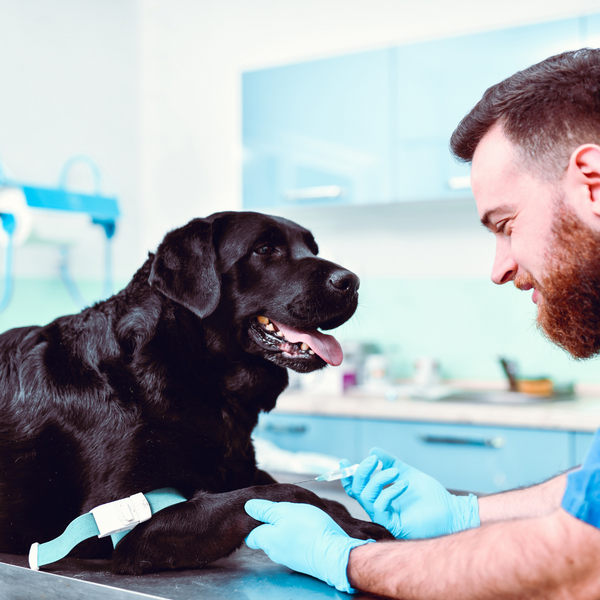
Why Are Pet Vaccinations Necessary? (Dog Edition)
(by Dr. Iuliana Mihai, DVM) Have you bought or adopted a puppy or an adult dog that did not come with health records, and you need to know what steps to follow to keep your cat healthy?
Whether you bought a dog or adopted one, the first step as a dog owner is to go with your pet to a veterinarian for a consultation. Following the consultation, if your pet is declared 'clinically healthy', vaccines can be administered by the vet staff. Like cats, dogs are also vaccinated for certain diseases.
Vaccination of a sick dog or a dog with a compromised immune system will only lower its immunity. Therefore, its immunity to the diseases for which your pet is vaccinated will be too low, and can even be zero.
It is important to choose to vaccinate our pets because we prolong their life and make them stronger in the face of certain viruses, some of which can be deadly. It also helps prevent zoonoses (any disease and/or infection which is naturally, directly or indirectly, transmitted from animal to human), including rabies.
What Should You Consider Before Vaccination?
As mentioned earlier, the first step is to make sure you have a healthy dog, and then the appropriate deworming will be done. Deworming your dog is important because it also helps prevent intestinal worms that can be transmitted to humans, especially in children (such as tapeworms). Vaccination can only be performed after these requirements have been met.
At What Age Can My Pet Dog Have Its First Vaccine?
If you have brought home a puppy that is between 6 and 8 weeks old, it can be vaccinated.
The recommended vaccination schedule for puppies is as follows:
- Between 6 and 8 weeks of age - vaccinate against distemper and parvovirus;
- Between 10 and 12 weeks - vaccinate against distemper, adenovirus (hepatitis), parvovirus, and parainfluenza (DHPPi);
- Between 16 and 18 weeks - DHPPi and antirabies;
- Annually - DHPPi and antirabies.
Certain vaccines for various conditions, such as kennel cough (Bordetella), leptospirosis, borreliosis (Lyme disease), are administered only if it is believed that the dog lives in the environmental conditions in which these pathogens live.
For these diseases, the vaccination schedule is as follows:
- 6-8 weeks of age - vaccine for kennel cough (Bordetella);
- 8 weeks - vaccine for Borrelia (Lyme disease);
- 12 weeks - vaccine for leptospirosis (Leptospira).
- With an annual booster for all.
Young adults, adults, and elderly dogs are vaccinated only with DHPPi and rabies, and then repeated annually.
Canine Parvovirus
Canine parvovirus is a very dangerous infectious disease for dogs, especially for puppies with low immunity, which is often fatal. It has two forms: cardiac and intestinal form.
The cardiac form is rarely seen in dogs over eight weeks because the virus is transmitted from mother to puppy, and if the mother is healthy, there is less chance that such a violent variant of the virus will affect the puppy. The parvovirus attacks the heart muscle, which is still sensitive in puppies, causing them cardiac problems for the rest of their lives. This form of parvovirus is fatal in most cases.
The intestinal form is the most common form of parvovirus, affecting the intestinal tract. It is transmitted through direct contact with the feces of an already infected dog or with an environment infected by other sick dogs.
At the intestinal level, the virus spreads into the bloodstream and destroys the white blood cells, affecting the intestinal tissue. As clinical signs, the dog will present with hemorrhagic diarrhea with a characteristic odor, fever, lethargy, no appetite, and vomiting. If there is no medical intervention, the dog will die from dehydration (diarrhea and vomiting) and starvation. It can also cause sepsis once the bacteria in the intestines reach the circulatory system.
Canine parvovirus does not have an established treatment, it is only symptomatic, with a high chance of success; therefore, the best approach is prevention - vaccination.
Do the maternal antibodies that are present in breast milk throughout lactation protect the puppies from parvovirus?
After the first 24 hours of life, the enteral barrier of the puppies’ changes and maternal antibodies, even if they persist in breast milk, will no longer be able to reach their systemic circulation. After the closure of the enteral barrier, the role of maternal milk antibodies in protecting the puppies against parvovirus becomes insignificant.
It is essential that puppies ingest colostrum (breast milk in the first 48 hours after birth) as much as possible and as soon as possible in the first 24 hours of their life to load up with antibodies.
Can my pet remain a carrier and transmitter of the parvovirus after remission?
After 14 days, the infection disappears from the body. Passing through the disease will ensure immunity for the rest of your pet's life without remaining an asymptomatic carrier and transmitter. Still, the virus will remain present in the environment for a very long time. It will be disseminated and transported over long distances on the body or fur of the healed animal, clothes, shoes, the owner's hand, other stray dogs, etc.
Other Diseases for Which Vaccination is Required in Dogs
Distemper is a disease that is caused by a virus that can enter the animal's body in several ways and can affect dogs, raccoons, ferrets, or skunks.
The virus primarily affects puppies between 2 and 6 months but can also be contacted by adult dogs. Adult dogs are more likely to recover, while puppies usually die. Also, unvaccinated dogs and puppies born to an infected mother have a high chance of becoming infected.
Distemper disease has two forms: nervous and the digestive form.
Most dogs are exposed to the virus through inhaling the respiratory secretions of an infected animal, direct contact with the saliva of the sick dog, or through direct contact with the urine or feces of an infected dog.
Once the virus enters the body, it reproduces in the dog's respiratory tract and spreads in the blood, the lymph nodes, and throughout the body. The virus can also infect the skin, intestinal tract, urogenital tract, or central nervous system.
After infection, the dog does not show obvious symptoms; they will appear gradually. The disease sets in about six days after infection, and the dog will develop a high fever and begin to produce purulent discharge from the eyes and nose. The dog will lose its appetite and become lethargic. In the next period, it will start vomiting and have diarrhea (digestive form). These two symptoms will lead to the dehydration of the dog and possibly death.
If the dog survives the digestive form, at two weeks, the nervous form will occur, and the dog will show clinical signs of neurological damage, such as walking in a circle, dizziness, non-recognition of the owner, etc. This phase can also lead to seizures or paralysis.
Other clinical signs that may occur are difficulty breathing, and thickening of the paws or nose. The treatment is symptomatic and often unsuccessful (depending on the animal's immune status).
Infectious hepatitis (Rubarth's disease) is a disease caused by a canine adenovirus and causes several infections in the body. It especially affects the liver, kidneys, eyes, and endothelial cells (those on the outer surface of blood vessels). Once inside the body, the virus reaches the bloodstream and from there into the saliva and feces.
If a healthy dog contracts the virus (through the feces or saliva of an infected dog), its antibodies will normally respond to it and the viral cells will pass through the organs for a period of 10-14 days, after which they will remain in the kidneys and will continue to affect the animal's life. The virus will also continue to appear in the urine for 6-9 months.
If the animal that contacts the virus does not have a very strong immune system, and its antibodies react only partially, the hepatitis will turn into a chronic one. Over time, this disease can cause a series of eye injuries, known as "blue eyes".
The clinical signs of canine infectious hepatitis include fever, anorexia, loss of appetite, diarrhea, vomiting, hepatomegaly, abdominal pain, fluid in the abdominal cavity, inflammation of blood vessels, encephalitis, inflammation of the cornea, etc. In severe cases, the blood vessels will collapse, clotting problems and nervous signs will appear, and death will occur in a few hours.
As with the medical conditions mentioned above, the treatment is symptomatic and does not always guarantee medical success.
Canine parainfluenza – this disease is a viral infection of the respiratory tract and is caused by the PI-3 parainfluenza virus. It is similar to the human flu and is manifested through coughing and sneezing. As in humans, the virus is easily transmitted, and once diagnosed, the pet must be kept away from other dogs. Usually, the virus is eliminated naturally, and there are few cases where treatment is needed for additional bacterial infections.
Rabies is an extremely well-known disease that is 100% fatal and can affect all animals and humans. It is transmitted through the saliva of the infected animal (through bites or scratches) and evolves aggressively and quickly.
Vaccination of pets is crucial for the prevention of several diseases, and in some countries vaccines are mandatory. Contact your local veterinarian to schedule your dog immunizations. Luckily, many veterinarians also provide annual reminders for recommended care including vaccinations and booster shots.
Spring Naturals is the Healthy Food Choice
Our team at Spring Naturals knows you care about the health of your beloved pet, so we’ve handcrafted our recipes to be the most nutritionally and functionally balanced dry dog and cat food on the market today.
We were the first to introduce whole pet food and the first to be certified low-glycemic. We were also the first to use human-grade meats and nutrient-dense superfoods like whole fresh fruits, berries, and vegetables. Browse our selection of dog foods in a variety of flavors at SpringNaturals.com/collections/dog.
Dr. Iuliana Mihai, DVM, Masters In Small Animals And Equines Pathology
Iuliana graduated from the University of Agronomical Sciences and Veterinary Medicine in 2012, Romania. She has a Master’s degree in Small Animal and Equines Pathology and a strong affinity for Veterinary Parasitology and Laboratory. In 2013 she started her Ph.D. in epithelial cancer in dogs and cats. She volunteered at the faculty’s clinic in her 3rd year of study, and continued her career in small animal pathology and laboratory. She has one cat and eleven rats. Her interests outside of work include traveling, writing, and crafting.

Post a Comment!